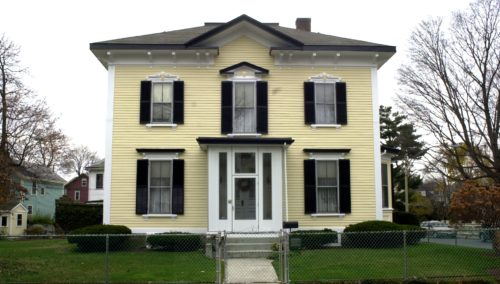 On some level, part of what makes faith “faith” is the kernel of unprovability at its center. Like, if there was an exacting formula I could use to definitively “prove” the existence of God, or Heaven, etc. — in the same way I’d use a series of mathematical methods to prove that the opposite sides of a triangle with two equal angles are also equal — then it wouldn’t be faith; it’d be another element of certainty I’d add to my life.
On some level, part of what makes faith “faith” is the kernel of unprovability at its center. Like, if there was an exacting formula I could use to definitively “prove” the existence of God, or Heaven, etc. — in the same way I’d use a series of mathematical methods to prove that the opposite sides of a triangle with two equal angles are also equal — then it wouldn’t be faith; it’d be another element of certainty I’d add to my life.
This doesn’t mean that I can’t (and don’t) have the existence of God “proven” to me on a daily basis. My blessings, the companionship, the intellectual stimulation . . . it’s all been part of a very rewarding and worthwhile relationship with Christ. But it’s like trying to “prove” that my wife loves me (or vice versa); there’s no medical test for “love,” no scientific proof that she hasn’t been performing some kind of really elaborate 14-year practical joke. (The film The Truman Show — where the main character discovers he’s unwittingly been a “character” in a 24/7 reality TV show his entire life — touches on the improvability of certain aspects of life.) But — much like my wife’s love — trying to “prove” the existence of God’s love, Jesus’ promises, etc. is ultimately a bit futile. If someone really wants to disbelieve, then there’s not much to stop them. God gave us free will, and with it comes the possibility of using it to act against reason.
But there’s a flip side to this: If — to my sorrow of sorrows — I’m (somehow) wrong, and it turns out God doesn’t exist, then . . . well, living my life as if He does is still a better way to live.
I thought of this as I reflected on today’s Gospel selection, from Luke. Teaching his disciples, Jesus speaks parabolically of a servant who — believing the Master isn’t coming anytime soon — “begins to beat the menservants and the maidservants, to eat and drink and get drunk . . .”
Let’s assume the servant was 100% correct, and the Master wasn’t coming soon. Is that still any way to live?
The servant who beats the other servants: Well, he’s just spreading more misery in the world, which will be reflected on others. The other servants’ day-to-day relations with him will no doubt be strained and unpleasant. Haven’t we all worked in an environment with toxicity and turmoil?
Gluttony and excess drink: I’m sure we’ve all heard stories of those who regret their eating excesses, who rue their binge drinking, who did some unspeakable act under the influence of alcohol. These are not happy people. These actions did not bring them true happiness.
If the only reason I’m not trashing my house, giving in to abusive tendencies, or partaking of every kind of sin and excess is a fear that my wife will come home and discover me . . . what does that say about me?
Isn’t living a good life — a life with love, compassion, virtue, discipline, and all manner of other gifts that are spoken of in Sacred Scripture — a reward unto itself?
Wouldn’t the servant be happier in a tidy, orderly household — as if the Master might come at any moment — even if the Master doesn’t arrive?
If we view the Master’s return as the “end times,” then — based on the past couple of millennia — it’s quite feasible that God won’t return in my lifetime. He may . . . and today’s Gospel selection is a good reminder of what we risk if we don’t live as if He might. But He may not. This doesn’t mean that it wasn’t worthwhile to live with God’s teachings, to let your heart be touched by His.
Similarly, if we view the Master’s return as being our own deaths, then it’s good to realize that it’s entirely possible that God will let people more wicked than us into Heaven. It’s His right! Hopefully your first thought of this prospect isn’t, “Gee, I need to lower my standards of behavior, so I can be juuuuust holy enough to squeak by into purgatory.” Someone whose adult years were (say) destroyed by addictions and sinful behaviors, who sees the error of their ways and repents enough to get into Heaven . . . well, it’s not like they “got away” with anything; they were living their own “hell,” here on Earth. If they make it to in Heaven, it’s proof of God’s love and the redemption open to everyone, not an endorsement of sinning more.
If you’re living in the Master’s house, and you’re conducting your life as if He might return at any moment, take a moment to look around. Smile. Enjoy the bliss of the life you’ve fostered. Ideally, perhaps you’re awaiting the Master’s return.
And if your “house” still isn’t quite in order . . . well, if you’re able to read this, you’re still alive, and you’re able to act. Whether you just need to tidy up or enact drastic measures to make your “home” worthy of the Master, there’s still time. Consider how the Sacraments of Reconciliation and Communion can bring you closer to God.
Regardless of what the Master does or doesn’t do — or what His plans ultimately turn out to be — what we do to prepare for Him can only enrich our lives.
